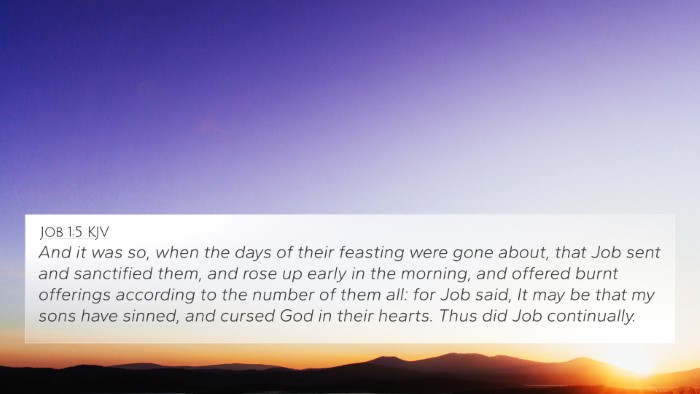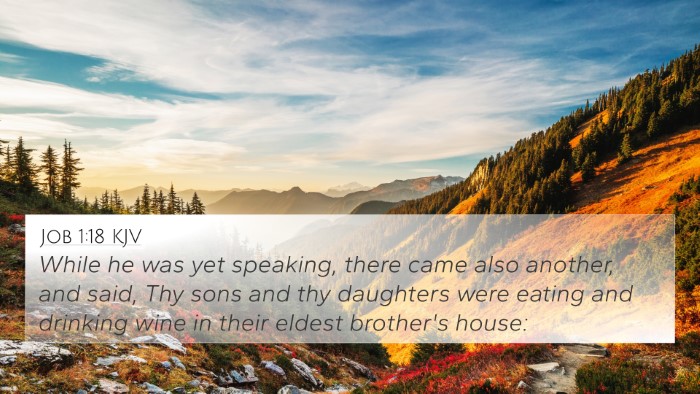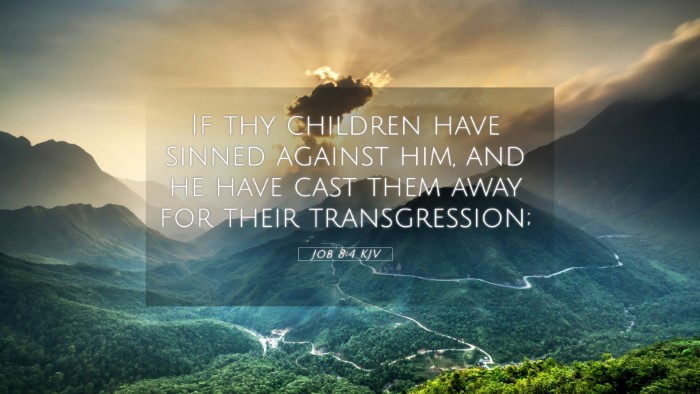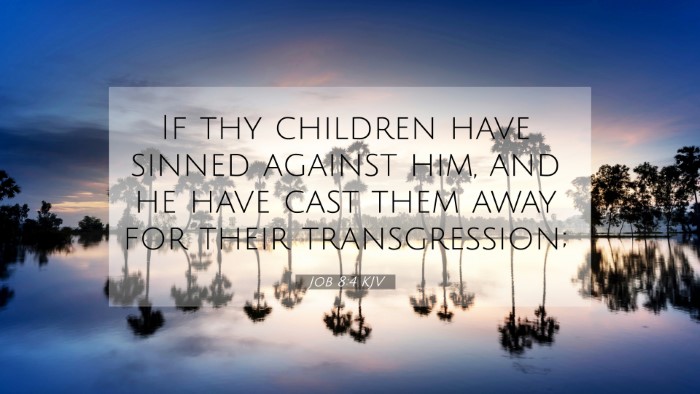Old Testament
Genesis Exodus Leviticus Numbers Deuteronomy Joshua Judges Ruth 1 Samuel 2 Samuel 1 Kings 2 Kings 1 Chronicles 2 Chronicles Ezra Nehemiah Esther Job Psalms Proverbs Ecclesiastes Song of Solomon Isaiah Jeremiah Lamentations Ezekiel Daniel Hosea Joel Amos Obadiah Jonah Micah Nahum Habakkuk Zephaniah Haggai Zechariah MalachiJob 8:4 Similar Verses
Job 8:4 Cross References
If thy children have sinned against him, and he have cast them away for their transgression;
Uncover the Rich Themes and Topics of This Bible Verse
Listed below are the Bible themes associated with Job 8:4. We invite you to explore each theme to gain deeper insights into the Scriptures.
Job 8:4 Cross Reference Verses
This section features a detailed cross-reference designed to enrich your understanding of the Scriptures. Below, you will find carefully selected verses that echo the themes and teachings related to Job 8:4 KJV. Click on any image to explore detailed analyses of related Bible verses and uncover deeper theological insights.

Job 1:5 (KJV) »
And it was so, when the days of their feasting were gone about, that Job sent and sanctified them, and rose up early in the morning, and offered burnt offerings according to the number of them all: for Job said, It may be that my sons have sinned, and cursed God in their hearts. Thus did Job continually.

Job 1:18 (KJV) »
While he was yet speaking, there came also another, and said, Thy sons and thy daughters were eating and drinking wine in their eldest brother's house:

Genesis 19:13 (KJV) »
For we will destroy this place, because the cry of them is waxen great before the face of the LORD; and the LORD hath sent us to destroy it.

Job 5:4 (KJV) »
His children are far from safety, and they are crushed in the gate, neither is there any to deliver them.
Job 8:4 Verse Analysis and Similar Verses
Understanding Job 8:4
Job 8:4 states, "If your children have sinned against him, he has delivered them into the hand of their transgression." This verse is spoken by Bildad the Shuhite, one of Job's friends, and represents an important theological perspective regarding sin and divine justice.
Summarized Meaning of Job 8:4
In this verse, Bildad emphasizes the principle of retribution theology, suggesting that suffering is a direct consequence of one’s actions. His statement implies that if Job's children have sinned, their suffering is deserved, which is a common belief during that time.
Insights from Commentaries
-
Matthew Henry:
Matthew Henry comments on the character of God as just and emphasizes that people often reap what they sow. He highlights the precarious nature of relying solely on this principle without considering God's mercy and grace. Henry suggests that Bildad’s statement reflects a narrow view of God’s justice, one that inadequately addresses the complexities of divine providence.
-
Albert Barnes:
Albert Barnes elaborates on “children having sinned against Him” as an indication of generational responsibility. He notes that the idea of punishment for the sins of children suggests a communal aspect of sin and consequence. Barnes also criticizes Bildad’s conclusions, pointing out that it’s inappropriate to assume Job’s children were inherently sinful without evidence.
-
Adam Clarke:
Adam Clarke points to the need for humility in understanding divine workings. He remarks that the view presented by Bildad shows a lack of compassion and consideration for Job’s suffering. Clarke suggests that this principle of divine retribution can lead to harmful theological conclusions, especially in the context of innocent suffering.
Cross-References and Thematic Connections
This verse connects to various themes within scripture, especially regarding sin and its consequences. Below are some pertinent cross-references:
- Exodus 20:5: Highlights the generational impact of sin.
- Deuteronomy 24:16: Affirms that children are not held accountable for their parents' sins.
- Psalm 94:23: Discusses God’s justice against wickedness.
- Proverbs 11:21: Suggests that the wicked will not go unpunished.
- Isaiah 3:11: Speaks of the retribution of the wicked.
- Ezekiel 18:20: Emphasizes personal accountability for sin.
- Galatians 6:7: Explains the principle of reaping what one sows.
- Romans 2:6: Discusses God’s judgment according to deeds.
- James 1:14-15: Reveals how temptation leads to sin and death.
- 1 Peter 4:17: Talks about judgment beginning at the house of God.
The Importance of Context in Understanding
When interpreting Job 8:4, it is vital to consider the surrounding context of the Book of Job. Bildad’s assertion represents a common belief of piety during that period—namely, that suffering is a direct result of sin. However, Job’s situation challenges this notion throughout the narrative, as Job is depicted as a righteous man undergoing undeserved suffering.
The Role of Bildad and His Friends
Understanding the discourse between Job and his friends is crucial for a comprehensive analysis. Each of Job's companions brings their own theological understanding, often leading to conflict rather than consolation. The dialogue serves to explore the complexities of human suffering and divine justice.
Application of Job 8:4 in Modern Context
Modern readers may interpret Job 8:4 in light of their experiences and beliefs about justice and suffering. This verse prompts essential questions:
- How do we view suffering in relation to sin?
- What does it mean to hold a just God accountable in times of turmoil?
- How can we offer compassion rather than judgment to those who suffer?
Conclusion
Job 8:4 encapsulates a fundamental aspect of theological inquiry and invites readers into a deeper understanding of divine justice and human suffering. The complexity of such themes encourages exploration beyond surface-level interpretations, aiding in seeking comprehensive Bible verse interpretations. Engaging in cross-referencing biblical texts can elucidate connections and promote a broader comprehension of scripture.
Further Study Suggestions
To delve deeper into the thematic connections of Job 8:4, consider using tools for Bible cross-referencing, such as:
- Bible concordance to find related verses.
- Bible cross-reference guide for exploring scriptural connections.
- Cross-reference Bible study methods for group discussions.
- Bible reference resources to aid sermon preparation.




